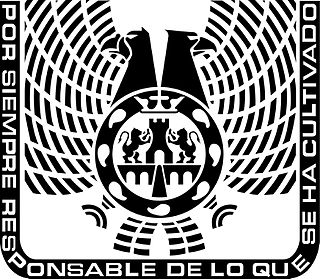
The National Autonomous University of Mexico is a public research university in Mexico. It is widely regarded as one of the best universities in Latin America. A portion of Ciudad Universitaria is a UNESCO World Heritage site that was designed and decorated by some of Mexico's best-known architects and painters of the 20th century. The campus also hosted the main events of the 1968 Summer Olympic Games. All Mexican Nobel laureates are alumni or faculty of UNAM. With acceptance rates usually below 10%, UNAM is also known for its competitive admission process.
Universidad de las Américas Puebla, commonly known as UDLAP, is a Mexican private university located in San Andrés Cholula, near Puebla. The university is known for its programs in Finance, Arts and Humanities, Social sciences, Science and Engineering, and Business and Economics. It is considered to be one of the most prestigious universities in Latin America, having been ranked the best private and single-campus university in Mexico by the newspaper El Universal, as well as being one of the only seven universities in Latin America accredited by the Southern Association of Colleges and Schools. The UDLAP has also been very successful in Mexican collegiate sports; their teams are the Aztecas.

Agustín Yáñez Delgadillo was a Mexican writer and politician who served as Governor of Jalisco and Secretary of Public Education during Gustavo Díaz Ordaz's presidency. He is the author of numerous books and the recipient, in 1952 as member of the Academia Mexicana de la Lengua, in 1973, of the Premio Nacional de las Letras. Al filo del agua is considered his most important work, according to the Encyclopedia of Latin American and Caribbean literature, 1900-2003 By Daniel Balderston, Mike Gonzalez, page 616.
The Spanish National Bioinformatics Institute is an academic service institution tasked with the coordination, integration and development of bioinformatics resources in Spain. Created in 2003, the INB is—since 2015—the main node through which the Carlos III Health Institute is connected to ELIXIR, a European-wide infrastructure of life science data, coordinating the other Spanish institutions partaking in the initiative such as the Spanish National Cancer Research Centre (CNIO), the Centre for Genomic Regulation (CRG), the Universitat Pompeu Fabra, the Institute for Research in Biomedicine (IRB) and the Barcelona's National Supercomputing Center.
Arturo ('Jack') Warman Gryj was a Mexican anthropologist, member of the cabinets of Carlos Salinas and Ernesto Zedillo, also an author of nine books, two of which have been translated to English. He also wrote multiple articles for the magazine Nexos. He has also taught social epistemology at the University of Chile.

The Universidad del Valle de México (UVM) is a private university founded in 1960 and one of the largest university systems in Mexico.

The National University of Equatorial Guinea is a public institution of higher education, being one of the main universities of Equatorial Guinea in Central Africa.

The Ministry of Health of Chile, also known as MINSAL, is the cabinet-level administrative office in charge of planning, directing, coordinating, executing, controlling and informing the public health policies formulated by the President of Chile. Notably, all employees pay 7% of their monthly income to FONASA, the funding branch of the Chilean Ministry of Health.
Bernardo José Gastélum Izabal was a Mexican physician, politician, and writer.

The Spanish National Health System is the agglomeration of public healthcare services that has existed in Spain since it was established through and structured by the Ley General de Sanidad of 1986. Management of these services has been progressively transferred to the distinct autonomous communities of Spain, while some continue to be operated by the National Institute of Health Management, part of the Ministry of Health and Social Policy. The activity of these services is harmonized by the Interterritorial Council of the Spanish National Health Service in order to give cohesion to the system and to guarantee the rights of citizens throughout Spain.

The Ministry of Health (MISAN) is the department of the Government of Spain responsible for proposing and executing the government policy on health, planning and providing healthcare as well as the exercise of the powers of the General State Administration to assure citizens the right to health protection. The Ministry is headquartered in the Paseo del Prado in Madrid, opposite the Prado Museum.

Omar Guerrero Orozco, Ph.D. in Public Administration by the National Autonomous University of Mexico, is full-time professor at the same institution and National Researcher Level III, which is the maximum level. He was director of the National Institute of Public Administration magazine from 1980 to 1982. He was member of the Social Sciences Committee of the National System of Researchers, collegial body in which he served as president (2003). He was recipient in 1979 of the “Public Administration Award” granted by the INAP. Guerrero is also member of the National Academy of Sciences since 1987 and of the Mexican Culture Seminar since 2006.

San Isidro de El General is the first district of the canton of Pérez Zeledón, in the southern part of the province of San José in Costa Rica, as well as the name of said district's main city.

The Mexican Red Cross is a non-governmental humanitarian assistance organization affiliated with the International Federation of Red Cross and Red Crescent Societies to help those in dangerous situations, such as natural disasters, as well as providing human health services. The organization finances its aid, assistance, and education programs through the work of thousands of volunteers and donation from individuals, institutions, organizations, associations and companies. It originated with a presidential decree in 1910 and was recognized internationally in 1912. Today it participates in national and international aid and disaster relief missions as well as various health services, training in first aid and for emergency medical technicians. Early in its history, it developed a program in nursing, which eventually became the Escuela Nacional de Enfermería y Obstetricia, today part of the National Autonomous University of Mexico.
The Escuela Preparatoria Tlalpan II "Otilio Montaño" is a senior high school in San Miguel Topilejo, Tlalpan, Mexico City. It is within the Instituto de Educación Media Superior del Distrito Federal (IEMS).

Purabá is a district of the Santa Bárbara canton, in the Heredia province of Costa Rica. The district consists of several large neighborhoods: San Bosco (Bosconia), Marías, Purabá, Lajas, and Calle Quirós.

The Carlos III Health Institute is a Spanish public health research institute, legally constituted as a public research agency, a type of quasi-autonomous entity under Spanish law. The ISCIII is integrated in the Department of Science and Innovation, although it also reports to the Department of Health in the institute's activities relating health, healthcare and its planning.

Luis Falcón Martín is a Spanish computer scientist, physician and Free Software activist. He is the founder of GNU Solidario, an organization focused in Education and Health. He is also known for his work in the areas of Social Medicine and as the author of GNU Health, a health and hospital information management system.

Antonio María Sáez Aguado is a Spanish politician and doctor. He is a member of the People's Party. He was the minister of health of the Junta of Castile and León from 2015 to 2019. He was appointed health minister of the Junta of Castile and León on 27 June 2011 until July 2019. He held positions of general director of public health and managing director of the regional management of health of Castile and León.
Ana Lucía de la Garza Barroso was the director of Epidemiological Operations Research at Mexico's Ministry of Health, a doctor in public health who has helped to modernize epidemiological intelligence, and during the COVID-19 pandemic has contributed to the coordination of the International Health component of the COVID-19 response operation in Mexico, providing daily reports on its progress.














